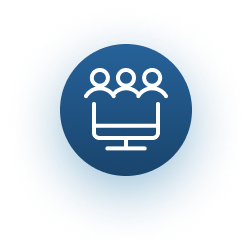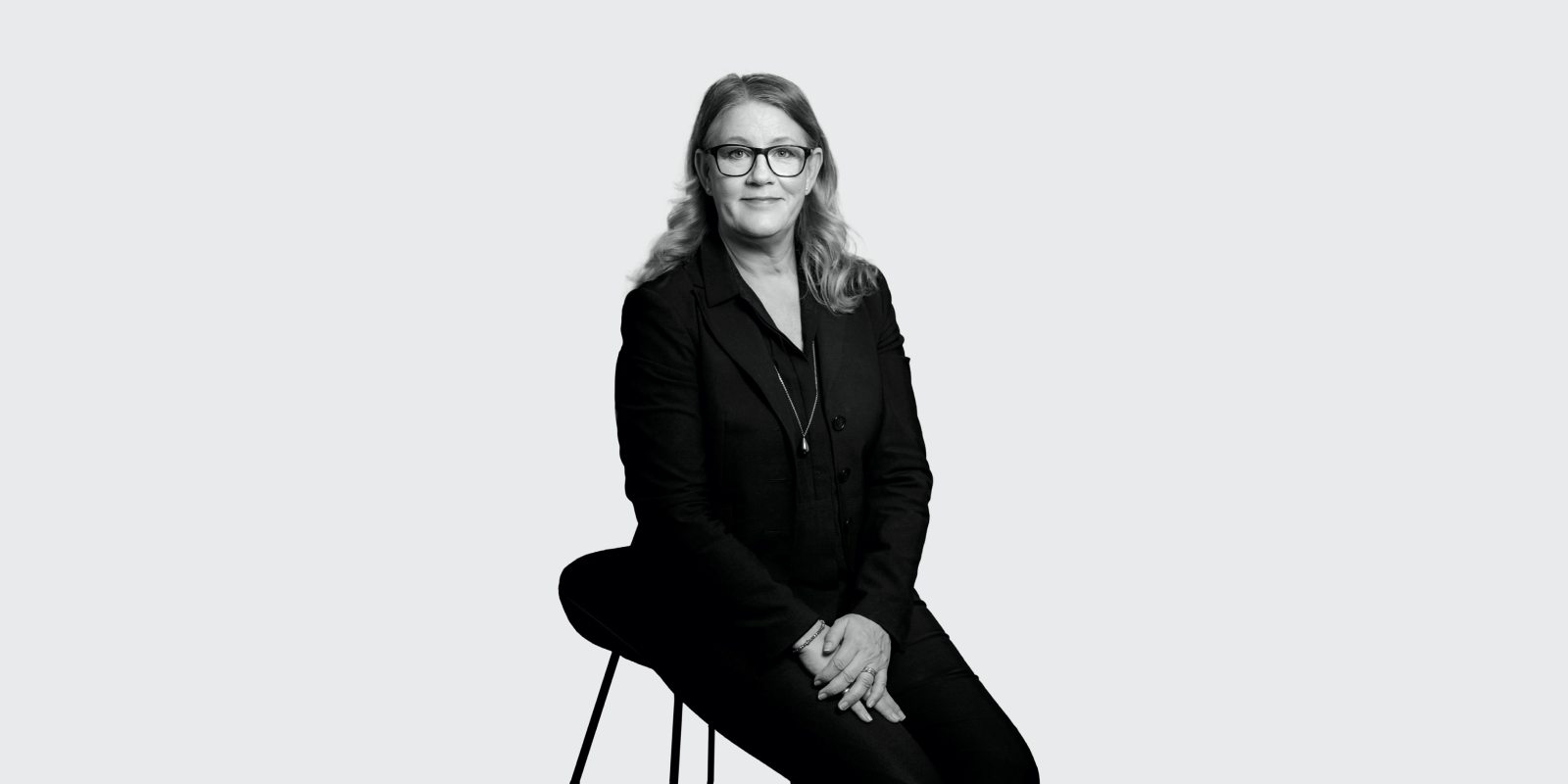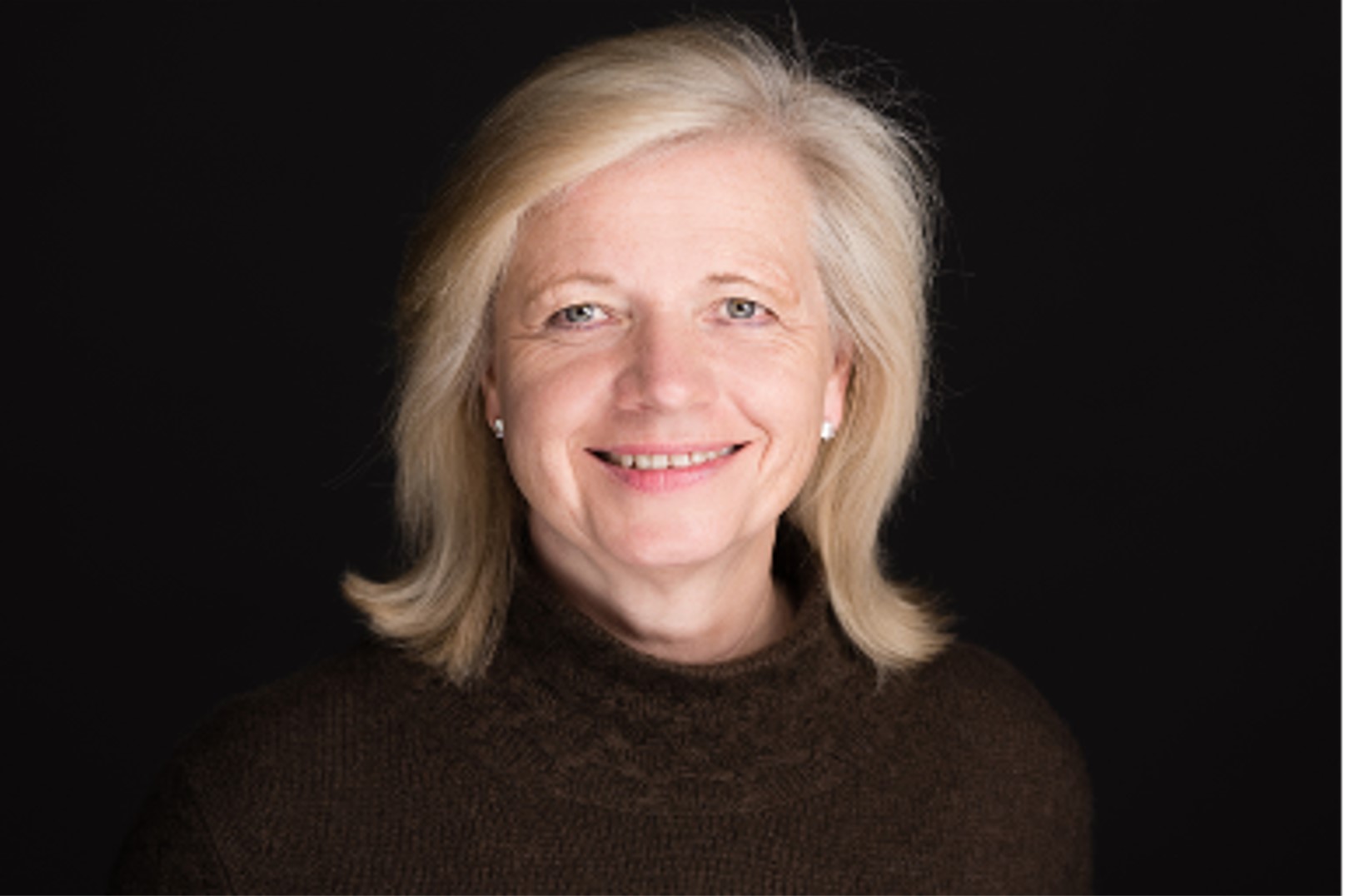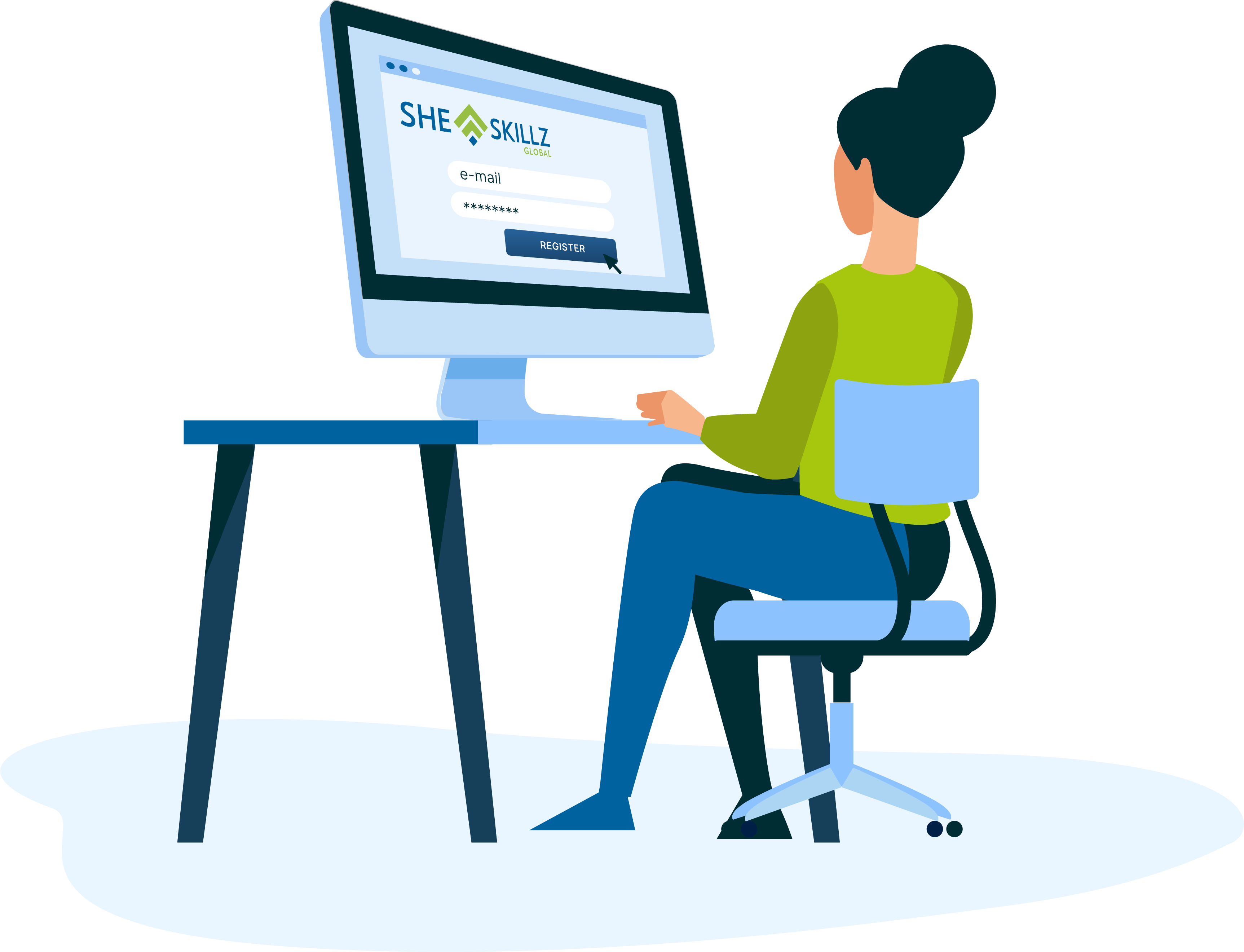Text: Guro Askheim Johnsen for SHESKILLZGLOBAL.
I met Jenny Furtenbach nearly 20 years ago. Back then, I needed a National Project manager for the Athletes Career Program that would also be globally responsible. At that time, Jenny was Marketing Manager at Adecco SE. She told her Swedish CEO that she wanted to develop the program in Sweden. Luckily for me, Jenny was not used to sitting down and waiting for opportunities (she still doesn’t). On the contrary, she seizes them. Hence, she is one of the best networkers I have ever met.
This is the second article in our series; Guro meets engaging executives for a chat about change management, leadership, work-related topics, gender equality and our vision: “A world where talent has no gender.”
Jenny has worked in various fields like conference hotels, tourist representation abroad, advertising agencies, high school marketing teaching, catering/events, wine, staffing, football club, a management consulting firm, digital marketing tool/app for retail industry, a consulting company with educational assignments for the national sports association, sponsorship/marketing/sales project management for larger network symposiums, and also started a network for board members 11 years ago. She has also been on the board of a golf club and for the last 7 years has run corporate brand agency. A company with 5 partners with physical delivery of services around “First Impression”. She has always been helping and coaching people around her that needed a push, helping them to believe in themselves and dare to take new steps. “Givers gain”
SHESKILLZGLOBAL vision is «A world where talent has no gender». What does this mean for you?
Everyone should have the opportunity to be a talent and not stand back due to religion, culture or old gendertraditions. We women, need to constantly have in mind that some of us still have to fight and raise their voicesto be heard and seen. If it wasn´t for my female ancestors in Sweden, who fought for our rights to be equal, I would not have the life and culture I have today that I somewhat take for granted. I know that Sweden is in front most other countries regarding gender equality, and I am grateful for being able to live in Sweden.
Where do you still see that Sweden has “a way to go” before gender equality?
In the field of starting up new businesses as an owner, the percentage of getting venture capital in Sweden only 1% goes to women. The numbers of owning shares in the company they work for is under 1 %, which means that the women are not included here. In large private capital companies on the stock market in Sweden, the numbers have gone up to 35 % women, year 2021. 100% government owned companies have 40/60 or 60/40 which they manage to sustain both in management level and board level because they have goals and routines for it. There is an organisation in Sweden called Allbright that measures the number of women and men on important levels such as board members, CEO, owning shares and head of the board.
Below: The number of women on boards of each country’s largest companies in the stock market.
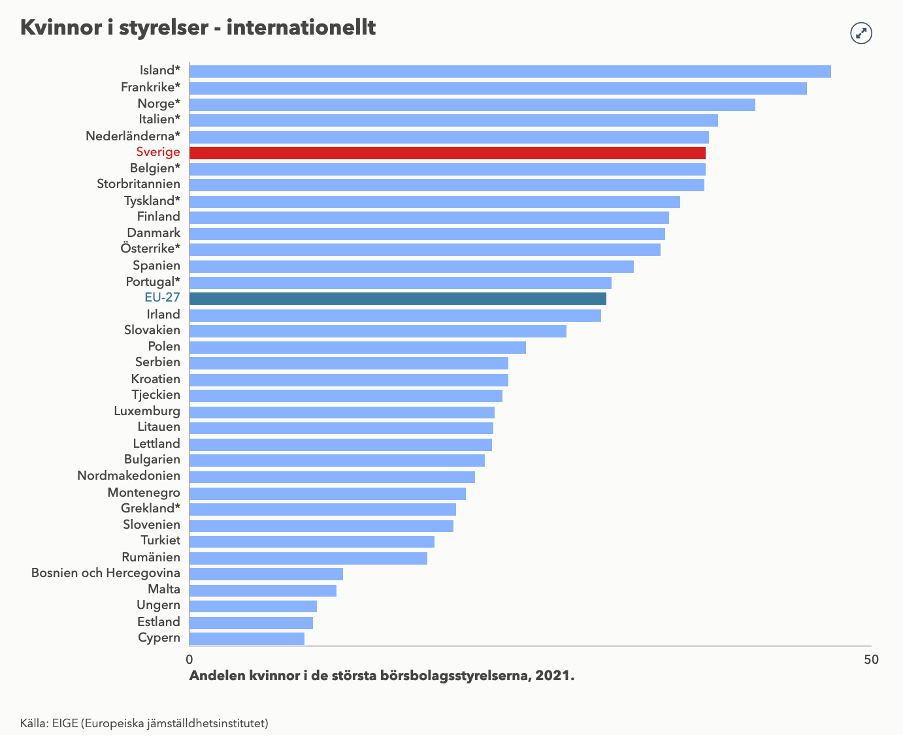
Private photo.In the middle stands Maud Olofsson who was the minister of economic affairs in Sweden, the woman who took the initiative of starting Styrelsekraft program 2009. Here she visited our board network Boarding for Success.
If you take us back to the young Jenny – from university until today – was there a plan behind your career?
I had no strategic plan to become a leader. I did not look upon it that way. I have always raised my hand and asked questions about why we do certain things in a certain way. I always came up with suggestions and solutions for change. This problem-solving attitude and proactiveness took me to new positions, leading teams. When I was 22 years old, I got my first job to lead staff and really liked it.
You are over 50 years now; if you look back to your first manager job more than 30 years ago, how have you changed as a leader?
I have grown thanks to the different positions I have had, where I encountered different work environments, cultures, companies I have worked for. Mostly I learnt by meeting lots of various people, helping them out and solving problems together. I have also learned a lot from bad management – like management by fear, which has given me insights on NOT to do things.
How will you describe yourself as a leader today?
I believe in myself, I feel confident, calm. I practice agile methods, I am very clear on my expectations, I always follow up on things and am always there to help. I am happy to see staff growing and use their skills to reach bigger goals. I draw strategic plans, and give tools for the staff to choose their own path. But I am also there to mentor if it is needed.
What has been your smartest choice in life, and why?
My smartest choice in life is the way I seize new opportunities as I come across them. I have been curious and brave enough to jump onboard jobs I didn´t know anything about. This has given me great stimulus, new ways of thinking, competences and kept me on my toes.
You mentioned earlier that in Sweden there is a shortage of women on boards. Was this the reason you started “Women for the board”?
I applied and participated in a governmental program called Styrelsekraft that the government arranged between 2009-2014 with one goal : give more women board-specific education and promote them to the market. During that period of time, 740 women attended the program. Each participant had a personal board mentor, passed board training and received a professional board network with other participants. The women who participated in Styrelsekraft were assured to be quality board members. But the government had no plan for these women after the graduation. After my one-year program, we were a group of about seven women (out of the 200 women the first year) and we decided to start a network, Boarding for Success in 2010, so not to lose contact. We also wanted to keep educating ourselves in the field of board competence and help each other to prepare new board assignments. After a few years we opened the network to men and we had around 130 members. In the year 2015, after Styrelsekraft program was over ,some of the women from the program started an alumni network called Styrelsekraft, exclusively for all the 750 women who had followed it. Back in 2009 the numbers of women on boards on the Swedish stock market was only 19% so I believe that both above initiatives have helped increase the numbers. What helped also was writing about it in the media. And possibly the new generation of women is more hungry for higher positions. They see themselves as able to manage both family life and a high position in their career. Which is a great improvement.
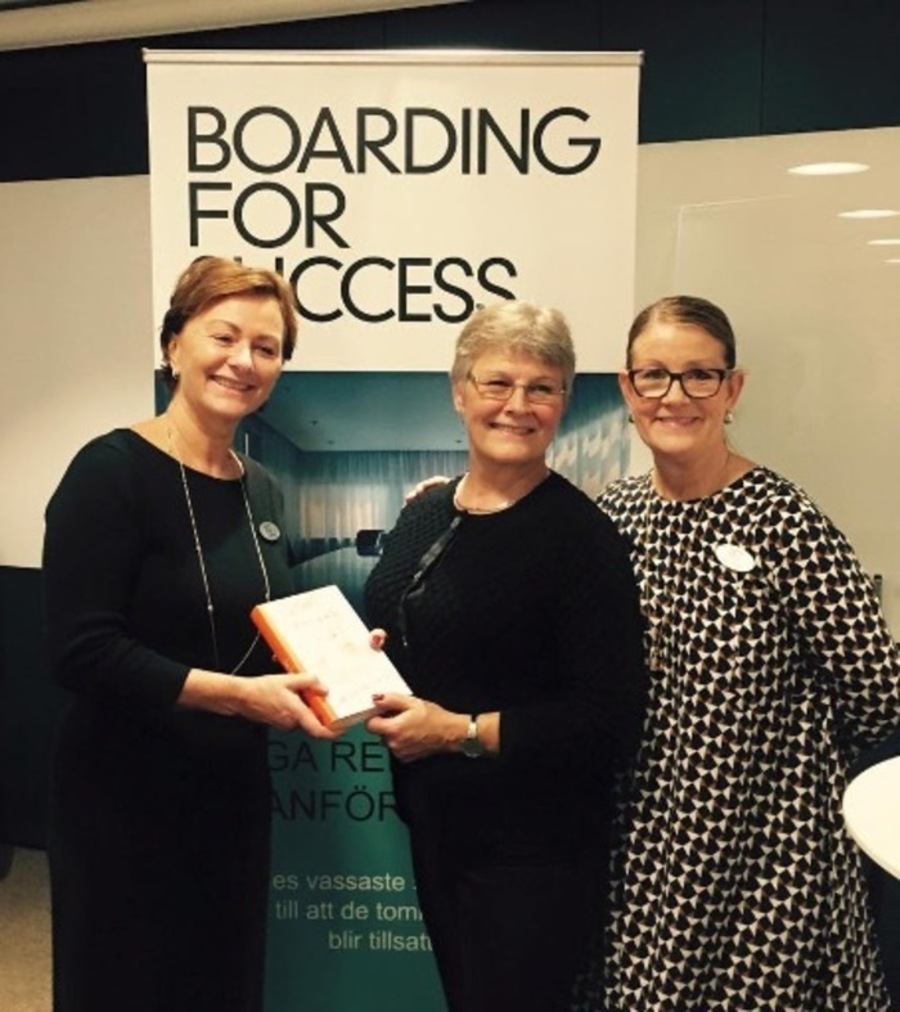
Private photo.In the middle stands Maud Olofsson who was the minister of economic affairs in Sweden, the woman who took the initiative of starting Styrelsekraft program 2009. Here she visited our board network Boarding for Success.
Have you been the only woman in a male-dominated work environment in some of your jobs?
For a woman seeking attention, with the will to make a work environment more equal, you should definitely look for a position in a business where few women work. But one must bear in mind it can be hard to get included and invited to the typical male activities such as golf, sauna or hunting. I think the best work climates are the ones where there is a mix of genders.
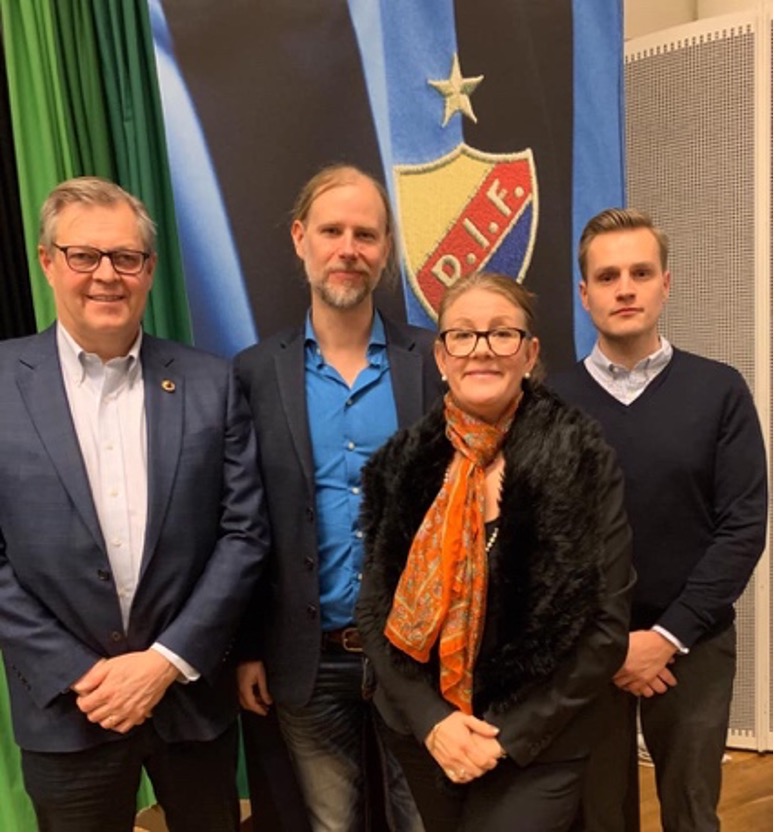
Private photo. The nominating committee at the football club Djurgården Fotboll.
What do you find most important as a leader when leading a team?
Motivate people and talents. People around you need to have the right feeling of WHY they work for that company and not another one. A leader needs to make them feel seen, acknowledged and proud of their work. They need to see the impact of what they do, and why it makes a difference for the company. If they feel recognised when they bring ideas or thoughts to “the table” and it’s clear their achievement matters, that they are allowed to make their own decisions, they will feel better. Being a better team worker and produce better results for the whole organisation will bring lots of daily laughs.
Why is gender equality and promoting other women essential for you?
It is utterly essential. Everything else feels outdated.
You are a mentor in SHESKILLZGLOBAL, where your mentee lives in another country. Why is this program essential for you, and what does it give you in return?
I am happy to contribute and to inspire other women, to share my experiences and thoughts. Being a mentor for someone from another country, also reminds me that nothing is to be taken for granted and that Sweden is the most secularised country in the world.

You are good at networking. Why is having a professional network so essential for you?
I have always had a natural talent for networking, I have done it intentionally since my early twenties when I saw the benefit of knowing people. My chosen networks have given me connections to people that I would never have had. It is easy to get a little bit too comfortable in your bubble so if it bursts and you need to look for a new job it is great to have a larger network to reach out to. You can start by building a network around you with people you like and trust. That’s true in your hobbies, sports, with your children’s friends parents. You can get active and take lead in events, projects, boards etc. You can also join digital networks online in fields you are interested in. Or go to seminars you find interesting, start a conversation with strangers, hook up and have lunch, find digital platforms where you can attend various events, such as Evenbrite.
What advice can you offer other women who want to climb the career ladder to succeed?
Have faith in your skills, try and challenge yourself. Don’t be afraid of asking others to help you, remain open, help other people and be strong but always humble. Always try new things.

Private photo. Jenny and her daughter Alice
Founder and CEO for SHESKILLZGLOBAL
-
Guro A. Johnsenhttps://www.sheskillzglobal.com/author/guro-johnsen/
-
Guro A. Johnsenhttps://www.sheskillzglobal.com/author/guro-johnsen/
-
Guro A. Johnsenhttps://www.sheskillzglobal.com/author/guro-johnsen/
-
Guro A. Johnsenhttps://www.sheskillzglobal.com/author/guro-johnsen/





